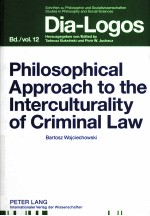图书介绍
PHILOSOPHICAL APPROACH TO THE INTERCULTURALITY OF CRIMINAL LAW【2025|PDF下载-Epub版本|mobi电子书|kindle百度云盘下载】

- BARTOSZ WOJCIECHOWSKI 著
- 出版社: PETER LANG
- ISBN:3631605854
- 出版时间:2010
- 标注页数:312页
- 文件大小:13MB
- 文件页数:316页
- 主题词:
PDF下载
下载说明
PHILOSOPHICAL APPROACH TO THE INTERCULTURALITY OF CRIMINAL LAWPDF格式电子书版下载
下载的文件为RAR压缩包。需要使用解压软件进行解压得到PDF格式图书。建议使用BT下载工具Free Download Manager进行下载,简称FDM(免费,没有广告,支持多平台)。本站资源全部打包为BT种子。所以需要使用专业的BT下载软件进行下载。如BitComet qBittorrent uTorrent等BT下载工具。迅雷目前由于本站不是热门资源。不推荐使用!后期资源热门了。安装了迅雷也可以迅雷进行下载!
(文件页数 要大于 标注页数,上中下等多册电子书除外)
注意:本站所有压缩包均有解压码: 点击下载压缩包解压工具
图书目录
Gratitude7
Introduction9
Chapter Ⅰ.The idea of pluralism and human rights in democratic multi-cultural societies19
1.Between the Scylla and Charibdis of cultural relativism19
2.Cosmopolitanism: The philosophy of world citizenship25
3.Ronald Dworkin’s right of equal treatment as the basis of liberal plu-ralistic society32
4.Human rights as the nature of intercultural consensus38
4.1.Human rights - the creation of "Western" imperialism?39
4.2.Human dignity as the basis of human rights45
5.Democracy in the globalization age52
5.1.Democracy in the 21st century52
5.2.Are democracy and human rights compatible?60
Chapter Ⅱ.Discursive - ethical justification of human rights and democracy64
1.The Ethics of Discourse in Karl-Otto Apel’s Transcendental-Pragmatic Philosophy64
1.1.The basis of discourse ethics65
1.2.Universalistic ethics of co-responsibility69
2.Jurgen Habermas’ theory of discursive reconstruction of law80
2.1.The role of procedural communicative rationality in justification of law81
2.2.Communicative reinforcement of democracy - deliberative policy90
3.Main assumptions of Robert Alexy’s legal argumentation103
3.1.The theory of discourse and human rights in Alexy’s philosophy of law105
3.2.Direct and indirect patterns of discursive justification of human rights110
4.Critical character of discourse theory119
Chapter Ⅲ.The principle of mutual recognition as a condition of inter-cultural legal discourse121
1.Philosophical roots of the theory of recognition121
1.1.Interpersonal character of human relations in Fichte’s idea of law121
1.2.Mutual recognition in Hegel’s philosophy of law125
2.General assumptions of the modern theory of recognition132
3.Patterns of intersubjective recognition: Axel Honneth’s moral grammar of social conflicts136
3.1.Love and the fight for recognition136
3.2.The fight for recognition in the sphere of modem law138
3.3.The role of social respect in shaping mutual recognition147
3.4.The principle of mutual recognition and the rules of discourse as constitutive elements for political and legal constructivist com-munity152
Chapter Ⅳ.Punishing as a negative reaction to illegal acts175
1.The notion and justification of punishment in an inclusive constructivist community175
1.1.Constmctivist community as an exponent of the openness of de-mocratic society176
1.2.Punishment as a manifestation of standard social practice183
2.Double justification of punishment in Hegel’s philosophy of law188
2.1.Argument from one’s right189
2.2.Argument from the relation of mutual recognition191
3.Participation in communicative activities and responsibility196
4.The protection of interaction processes in the light of criminal law199
5.Changing roles between the victim and the offender, and the justification of punishment207
6.Relation of criminal law to morality214
Chapter Ⅴ.Punishing as a condition of maintaining social balance226
1.Punishment as the restoration of balance226
2.Public reaction to the evil in the form of condemning the offender235
3.Punishment as a means of restoring the relation of mutual recognition243
3.1.Penal consequences of infringing the principle of mutual recognition244
3.2.Is the act of committing a crime a condition to exclude an offender from the community?249
4.Punishment as a message for society264
5.Interculturaland international penal law266
5.1.Notional relation of "intercultural" and "international" law268
5.2.The idea of the "end of impunity"277
Conclusion284
Literature293
热门推荐
- 3217500.html
- 3142573.html
- 3371923.html
- 3028456.html
- 975548.html
- 350000.html
- 2465447.html
- 2640882.html
- 2986254.html
- 2549859.html
- http://www.ickdjs.cc/book_1841333.html
- http://www.ickdjs.cc/book_127865.html
- http://www.ickdjs.cc/book_2333560.html
- http://www.ickdjs.cc/book_1134308.html
- http://www.ickdjs.cc/book_831202.html
- http://www.ickdjs.cc/book_230484.html
- http://www.ickdjs.cc/book_263753.html
- http://www.ickdjs.cc/book_3467581.html
- http://www.ickdjs.cc/book_780391.html
- http://www.ickdjs.cc/book_3443405.html